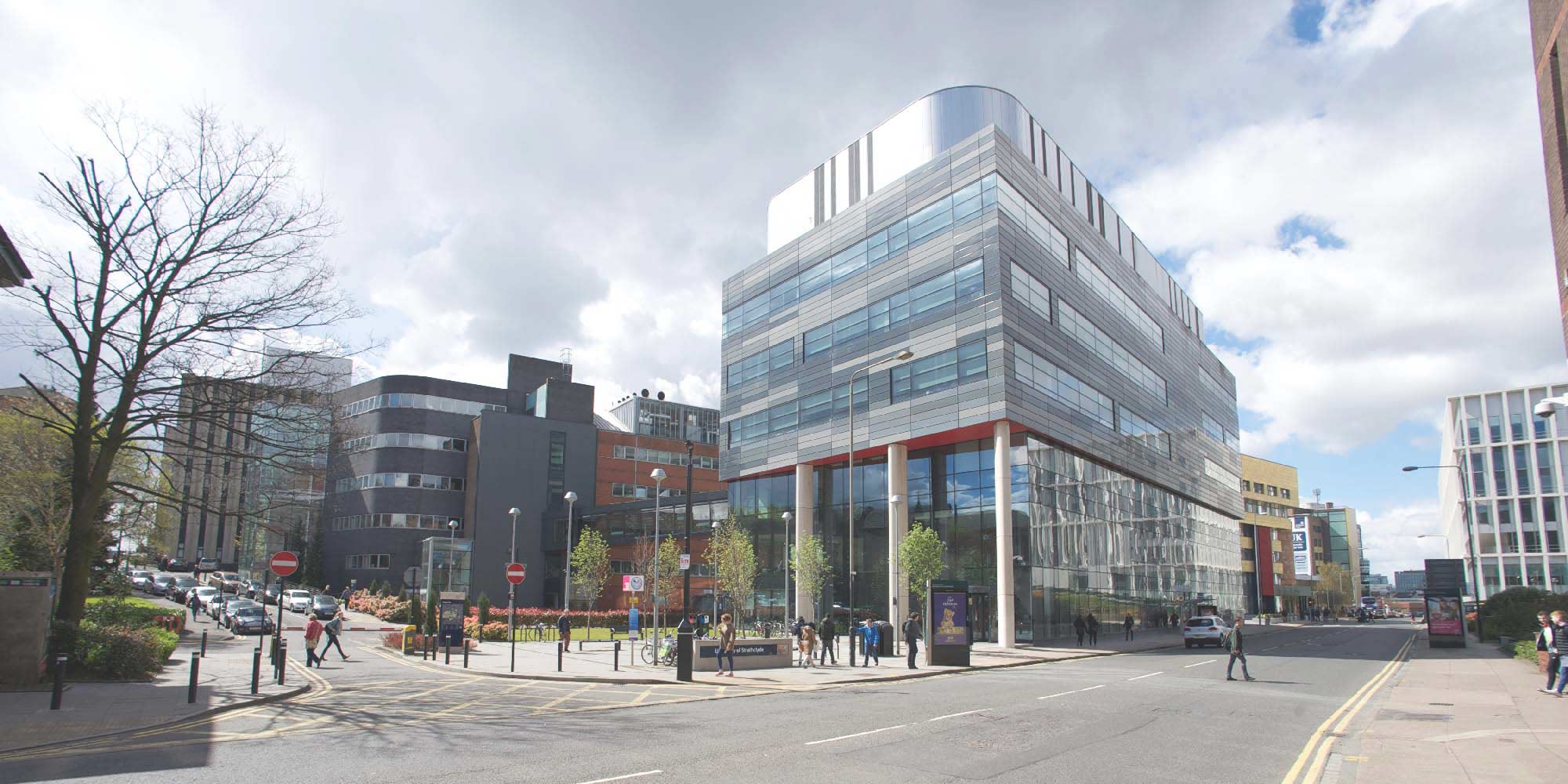LLB Law (Graduate Entry)
ApplyKey facts
- UCAS Code: M115
- Accreditation: Law Society of Scotland
Facilities: Strathclyde Law Clinic
Study with us
- an accelerated three-year option where you can begin study in second year of the standard LLB
- gain practical court-room experience through the Mooting Society and enter competitions
- develop your legal skills as a member of Scotland’s largest student-run Law Clinic
- benefit from high-quality research-led teaching at one of Scotland’s leading providers of legal education
Why this course?
The Law School at Strathclyde is one of Scotland’s leading providers of legal education.
Studying Law concerns the obligations, duties and rights of every member of society in relation to their neighbours and to society.
This course offers you the opportunity to undertake a law degree recognised in Scotland.
You'll gain in-depth knowledge of Scots law in a department that puts special emphasis on experiential learning.
We're home to Scotland’s biggest student-run law clinic, which offers a unique, real-world, learning environment, and to Ardcalloch, a virtual community where the legal issues of everyday life are played out.


What you’ll study
This is an accelerated programme for graduates from other disciplines. You'll study a three-year LLB condensed into two years covering all the required professional subjects required by the Law Society of Scotland to practice as a solicitor in Scotland. You'll be given the opportunity to take additional subjects required for practising as an advocate if you so wish.
Depending on performance, there may be an opportunity for you to proceed to an Honours year.
First year of study
Legal Processes and Systems, Law of Persons, Criminal Law and Evidence, Law of Property, Constitutional Law, Law of Obligations 1, Law and Society.
Second year of study
Law of Obligations 2, Administrative Law and Fundamental Rights, Commercial Law, EU Law, Reflective Project, Elective Modules.
Facilities
Law Clinic
Strathclyde’s Law Clinic is run by students for members of the public who cannot afford a lawyer and are not eligible for legal aid.
More than 200 of our students are now involved and regularly represent clients in Small Claims and Sheriff Courts.
Students admitted to membership of the Strathclyde Law Clinic are able to follow the LLB (Clinical) programme.
Students receive basic training in legal skills, such as interviewing, negotiation and advocacy and (in the Clinical Legal Practice course) reflecting on experiences and on the ethics and justice of legal practice. Assessment in relevant courses such as Employment Law and Housing Law will be partly on the basis of students’ handling of cases.
Find out more about our Law Clinic.
How to become a lawyer
There are different routes to a career in law. The choices you make now can affect the steps you would need to take to achieve your desired career in law. Here we explore the process of becoming a lawyer in Scotland and look at the different roles available within the law profession.
How to become a lawyer
Semester 1
Legal Processes & Systems
The aim of this module is to provide students with an introduction to the concepts, structures and processes that make up a legal system. It is designed to equip all students studying law with the knowledge and understanding that they will utilise in all other law modules: the “tools of the trade”.
Law of Persons
The aim is to teach students the rules governing, and the definition of, legal and natural persons, their status and capacity. The module is also designed to introduce students at the very start of their legal studies to the idea that legal concepts can be both natural (the child) and non-natural (the limited liability company) – both are “persons” in law.
Criminal Law & Evidence
This module is intended to familiarise students with, and elicit an understanding of, the basic elements of Scots criminal law and evidence, including the development of the system, fundamental concepts and their operation in relation to certain specific crimes. The module will teach the application of fact handling, rhetoric and proof by lawyers and the contexts in which the rules of evidence operate, all integrated practically with the criminal law.
Law of Property
The aim is to teach students the classification of property in the Scottish legal system, how ownership is distinguished from possession, how property is acquired, the rights it carries, and how property can be transferred. The module is also designed to introduce students to some of the conceptual issues of property, including how “property” itself is defined either as an item or as a relationship; and how property can be corporeal (a thing) or incorporeal (an idea or right, such as copyright).
Semseter 2
Constitutional Law
The aim of this module is to introduce students to the institutions, actors, processes and concepts that make up the UK constitution including its particular application to Scotland. It is designed to introduce students to methods of critical engagement with constitutional law in both theory and practice.
Law of Obligations 1
The aim is to introduce students to the concept of obligations that can be enforced by legal process. Students will also have the opportunity to develop their problem-solving skills and ability to construct appropriate legal questions and answers.
Law & Society
This module engages with some challenging problems faced by law within contemporary society. It introduces students to some aspects of the social, political, and ethical conditions in which law operates. It deals with the interaction of law with justice, politics, morals and equality. The course will examine the role and challenges of law in times of social change. The course is structured around three key themes:
- legal reasoning
- law & politics
- law & social change
Semester 1
Law of Obligations 2
The aim is to teach students the rules governing claims for personal injury, economic loss and hurts to personality rights. The design of the class will help to develop problem solving and advice-giving skills in relation to the law of delictual liability generally.
Administrative Law & Fundamental Rights
The aim of this module is to introduce students to the institutions, actors, processes and concepts that make up administrative and human rights law including their particular application to Scotland. It is designed to introduce students to critical engagement with administrative law, both in theory and in practice.
Semester 2
Commercial Law
Commercial law is a second year compulsory subject on the LLB (and LML) degree. The class provides you with an understanding of commercial law in a Scottish context. It partially meets the commercial law subject requirements and related skills outcomes of the Law Society of Scotland and the Faculty of Advocates (albeit that some of the commercial professional topics, eg sale of goods and insurance law, are dealt with by other courses).
Building on the knowledge you acquire in first year, the general academic objective of the course is to examine the basic principles and rules concerning core aspects of commercial law, including the main principles of agency, partnership and company law, the law relating to various methods of payment (including consumer credit and bills of exchange) the rules governing the ways in which creditors can ‘secure’ repayment of a debt (eg through taking personal guarantees from third parties for repayment of the debt, or by establishing rights in security over debtor property); the basic principles of diligence; the consequences of both corporate and individual debtor inability to repay debts (corporate insolvency and personal bankruptcy respectively).
While the focus of the class is on ‘a black letter’ analysis of relevant statutory and common law in the broad commercial area, in order to aid understanding of relevant principles, the class also examines the policy rationales underlying the current law and recent and projected reforms in this area
EU Law
The EU law class focuses on the constitutional and institutional order of the EU as well as one the internal market. To this end, the class looks at the European integration process, the EU institutions, EU competences, the decision-making process within the EU, the principles underpinning the EU legal order and the principles governing the internal market.
Reflective Project
The aim is to enhance students' ability to undertake independent learning, and to ensure that they take a reflective approach to their work while at the same time developing a consciousness of the ethical dimensions of professional legal practice.
Elective modules
In addition, students will be required to do three elective modules. Optional modules change year on year, so please check with the Law Course Support Team at the start of the semester to confirm which classes are available.
Assessment
We use many different methods of assessment, in addition to exams and course work.
Students from all years can participate in various mooting competitions and Strathclyde has impressive success rates in these.
Many students have also competed successfully in national and international mediation competitions.
Learning & teaching
As well as lectures, tutorials and seminars, our teaching methods include experiences such as the Law Clinic and legal practice.
Chat to a student ambassador
If you want to know more about what it’s like to be a Humanities & Social Sciences student at the University of Strathclyde, a selection of our current students are here to help!
Our Unibuddy ambassadors can answer all the questions you might have about courses and studying at Strathclyde, along with offering insight into their experiences of life in Glasgow and Scotland.
Chat to a student ambassadorEntry requirements
| Academic requirements | Second-class Honours or Pass/Ordinary degree. Applicants who do not meet these requirements may also be considered. |
|---|---|
| International students | View the entry requirements for your country. |
University preparation programme for international students
We offer international students (non-UK/Ireland) who do not meet the academic entry requirements for an undergraduate degree at Strathclyde the option of completing an Undergraduate Foundation Programme in Business and Social Sciences at the University of Strathclyde International Study Centre.
Upon successful completion, you can progress to your chosen degree at the University of Strathclyde.
Fees & funding
All fees quoted are for full-time courses and per academic year unless stated otherwise.
Note: (If not otherwise indicated, non-graduating/modular fees will normally be charged at a pro-rata % of the equivalent full-time fee, based on the number of credits enrolled in each year.)
Fees may be subject to updates to maintain accuracy. Tuition fees will be notified in your offer letter.
All fees are in £ sterling, unless otherwise stated, and may be subject to revision.
Annual revision of fees
Students on programmes of study of more than one year (or studying standalone modules) should be aware that tuition fees are revised annually and may increase in subsequent years of study. Annual increases will generally reflect UK inflation rates and increases to programme delivery costs.
| Scotland | £10,150 |
|---|---|
| England, Wales & Northern Ireland | £10,150 |
| International | £21,700 Students are advised to research funding their course well in advance of commencing their studies. |
| University preparation programme fees | International students can find out more about the costs and payments of studying a university preparation programme at the University of Strathclyde International Study Centre. |
| Additional costs | No additional costs for law modules and all compulsory material is in the library. International students may have associated visa and immigration costs. Please see student visa guidance for more information. |
| Available scholarships | Take a look at our scholarships search for funding opportunities. |
Please note: All fees shown are annual and may be subject to an increase each year. Find out more about fees.
Find out what our students think

Sarah Fairley
Law Graduate Entry
Being a member of Strathclyde’s Law Clinic has been a fantastic experience, getting to work alongside some fantastic law students, helping people who otherwise may not have been able to access justice.

Savio Baptista
LLB Scots and English Law
At the University of Strathclyde, students will greatly benefit from the quality of teaching. The manner in which lectures are delivered opens the door to deeper learning.

Shona Westwood
LLB Law
Strathclyde, in terms of supervisors and tutors have some of the highest quality in their employ. Not just in terms of knowledge and experience but in terms of compassion and understanding.
How can I fund my studies?
International Students
We have a number of scholarships available to international students. Take a look at our scholarship search to find out more.
Dean's International Excellence Award
This scholarship is for new international students who will begin a full-time undergraduate course in the Faculty of Humanities and Social Sciences in September 2024. The award is a £5,000 scholarship per year for the duration of their degree (total of £20,000 for a four year course). All offer-holders are eligible for this scholarship.
Dean's International Excellence Award
Careers
Most Strathclyde LLB graduates enter the legal profession after completing the Diploma in Professional Legal Practice and a two-year traineeship in a law firm.
Trained Scottish lawyers are increasingly in demand in England and abroad.
There are also many job opportunities for legally-trained graduates in areas such as finance, management consultancy, teaching, central and local government, human resource management, social work and education.
Law graduates can enter many of these immediately after obtaining an LLB. For others it may be necessary to consider a one-year postgraduate course.
Where are they now?
Recent job titles include:*
- Environmental Consultant
- Trainee Solicitor
Recent employers include:
- Crown Office and Procurator Fiscal Service
- DEBRA
*Based on the results of the national Destinations of Leavers from Higher Education.

I teach international and EU environmental law. In order to properly understand the regulatory and institutional features of the different areas of environmental regulation, students must be confronted with the scientific, social, economic and political complexities of largely transnational processes that shape the content and implementation of environmental law.
Programme leader
Glasgow is Scotland's biggest & most cosmopolitan city
Our campus is based right in the very heart of Glasgow. We're in the city centre, next to the Merchant City, both of which are great locations for sightseeing, shopping and socialising alongside your studies.
Life in Glasgow
Apply
Part-time applicants who wish to apply to the University of Strathclyde should use the 'Direct Applications' link below.
We have limited places available via clearing. Please email your degree certificate and transcript to studywithus-hass@strath.ac.uk who will let you know if you're eligible to apply via clearing.
Start date:
Law (Graduate Entry) (2 year entry)
Start date:
Law (Graduate Entry) (2 year entry)
Start date: Sep 2023
Law (Graduate Entry) (2nd year entry) - part-time
Start date: Sep 2024
Law (Graduate Entry) (2 year entry)
Have you considered?
We've a range of courses similar to this one which may also be of interest.

